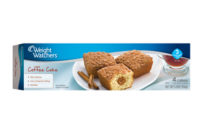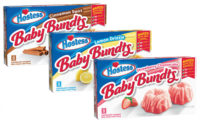State of the Industry 2016: What spells success for sweet goods?
Bakers redefine their indulgent offerings to appeal to health-minded shoppers.

courtesy of Classic Cooking

courtesy of JaceyCakes

courtesy of ARYZTA LLC

courtesy of Flowers Foods

Sweet Goods Sales

Sweet Goods Sales

Sweet Goods Sales







When it comes to sweet goodslike doughnuts, Danishes, sweet rolls, muffins and coffee cake, the market is in a state of flux. As Walter Postelwait, president of Pak Group LLC/Bellarise Baking Ingredients, Pasadena, CA, puts it: “The total segment appears to be growing slowly, but has hot pockets of activity.”
Overview | Bread | Tortillas | Sweet Goods | Snack Cakes | Pizza | Desserts | Cookies | Buns & Rolls | Bars | Breakfast Products
One area of activity is in better-for-you. “The overall sweet goods market is changing,” says Judie Giebel, technical service representative, Briess Malt & Ingredients Co., Chilton, WI. “Sugar-filled pastries, sweet rolls and doughnuts are occasional treats, while healthier breakfast-type sweet goods are climbing in popularity. Sugar reduction and clean labels have become the mantra of the food industry, including sweet goods.”
But despite better-for-you interest in sweet goods, traditional products segments continue to pace well and show annual growth.
Market data
According to data from IRI, Chicago, for the 52 weeks ending April 17, 2016, doughnuts, muffins and pastry/Danish/coffee cakes all posted dollar sales gains:
- Pastry/Danish/coffee cakes up 5.43 percent to $1.9 billion
- Doughnuts up 5.29 percent to $1.9 billion
- Muffins up 13.00 percent to 901.2 million
Hostess saw the biggest gains in pastry/Danish/coffee cakes, up 76.45 percent in dollar sales to $85.52 million. The top performer in doughnuts was Bon Appetit, up 101.13 percent to $13.27 million. In muffins, General Mills saw sales rise by 331.72 percent to $14.34 million.
Private label also tracks well in these categories, holding a No. 1 or No. 2 slot across the board. In pastry/Danish/coffee cakes, private label grew by 5.91 percent to $335.42 million. In doughnuts, private label increased by 6.13 percent to $413.92 million. And in muffins, private label was up 13.71 percent to $273.39 million for the period.
Looking back
Many of the clean-label and better-for-you directions we see across other categories are coming into play with sweet goods. “We see the following trends: smaller portion sizes, cleaner labels—like non-GMO, organic, including nuts, etc.—and a move toward more gluten-free products,” says Alex Peña, director of product development, Pak Group. “We believe all of these are related to health-and-wellness in one way or another.” That’s why the company has recently focused on new and growing lines of organic and non-GMO ingredients, including a full line of organic dough conditioners, organic softeners and non-GMO yeast products.
ARYZTA recently launched a line of clean-label OtisSpunkmeyer products that includes muffins. The products carry a “No Funky Stuff” tag line. They’re made without artificial flavors or colors, high fructose corn syrup or partially hydrogenated oils.
Small portion sizes are an area of focus, and one that fits well with sweet goods. Patricia Kennedy, president, WP Bakery Group USA, Shelton, CT, believes small and mini products can offer manufacturers a higher price per pound, as well as appeal to consumers conscious of serving sizes. “This trend has its origin in Europe, and European producers already export millions of mini products into the U.S.,” she explains. WP Bakery Group offers the SoftStar CT and SoftStar CTi, high-performance dough dividing and moulding machines for small and mini dough balls and adjustable fat absorption.
“Consumers have traditionally eaten sweet baked goods to indulge in a treat,” says Giebel. “But today, some are looking for healthier, more nutritious indulgences or better-for-you treats that still taste good.” Specifically, she points to a demand for less sugar,which can be a challenge in a category appealing to consumers with a sweet tooth. Briess Malt & Ingredients offers a new InnoSweet Sprouted Whole Wheat Powder, produced using a natural conversion process that “creates sweetness, while retaining all the whole grain benefits,” she says. “This product helps contribute to a clean label by adding claims like whole grain, no added sugars, sprouted, non-GMO, high fiber, natural, kosher and made in the U.S.”
Classic Cooking is known for including vegetables in its products, including a new line of Garden Lites Blueberry Oat muffins, which are made with zucchini and carrots, as well as blueberries. Its front-of-pack claims include gluten-free, dairy-free, 120 calories, 3 grams fiber and 5 grams whole grains.
Including probiotic ingredients can also attract attention. JaceyCakes adds probiotics to its FlapJacked Mighty Muffins, available in Double Chocolate and Cinnamon Apple.
Incorporating healthier ingredients can sometimes be challenging for bakers due to higher costs and limited availability of such ingredients. “There are not always organic, clean-label or healthy options available for every type of bakery ingredient needed to develop a stable, great-tasting sweet good,” says Peña. “In addition, the non-GMO and organic certifications sometimes slow down product development for these items, as the paperwork needed to meet these requirements is time-consuming and, at times, daunting.”
That’s why many bakers look to the production line for answers. According to David Moline, sales and marketing manager, Moline Equipment, Duluth, MN, there has been a recent increase in demand for high-volume systems. “Moline is constantly being asked for the largest system possible, so the manufacturer can achieve the lowest cost per unit,” he says. “A secondary trend is 24/7 operation, often for weeks at a time. On a doughnut system, one process consideration is continuous sediment removal from the doughnut fryer and continuous oil filtration. Moline Libra fryers are equipped with continuous sediment removal and designed to integrate with continuous oil filters and bulk oil systems.” The Libra systems, he adds, have been proven for continuous production periods of more than four weeks.
While better-for-you products often bring their own level of flavor diversity through nontraditional ingredient use, traditional products can gain new life through interesting flavor choice. In this area, bakers often use limited-time offers (LTOs) to pique shopper interest. Over the past year, Flowers Foods launched two Spring Edition Tastykake doughnut products, Peach Cobbler and Strawberry. Hostess also released an LTO Red Velvet product under its Donettes line.
Looking forward
Future trends in sweet goods will run the gamut, says Kennedy, from new shapes to different fillings and glazes. This will often drive bakeries to invest in new equipment or lines.
Giebel believes that future trends will center on health demands. “The public is more health-concerned and wants to know what they are consuming,” she says. “Look for the next generation of sweet goods to be more nutritious and not just empty calories. Sweet goods are going to have to offer smaller portions that are calorie-friendly, clean label and delicious.” On her radar are exotic flavors that can entice the consumer to indulge.
“I believe some of the fading categories like doughnuts and muffins can be revitalized by using healthier ingredients and options to make a very tasty alternative,” agrees Peña, adding that ancient grains or vegetable powders can up the nutritional ante. “These types of ingredients could create a sweet and tasty product, yet also have healthy benefits for the consumer. Many other subcategories could be revitalized through similar product development.”
Overview | Bread | Tortillas | Sweet Goods | Snack Cakes | Pizza | Desserts | Cookies | Buns & Rolls | Bars | Breakfast Products
Looking for a reprint of this article?
From high-res PDFs to custom plaques, order your copy today!












